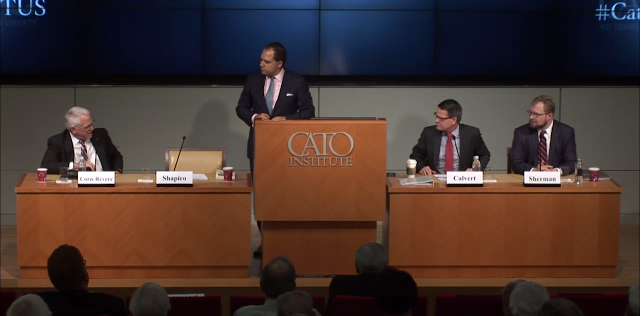On Monday, the Cato Institute held a day-long symposium entitled “The Supreme Court: Past and Prologue – A Look at the October 2016 and 2017 Terms.” The event coincided with the release of the newest issue of the Cato Supreme Court Review, which provides an annual look at the preceding term and future path of the U.S. Supreme Court. The symposium featured panels on various legal topics, including a number of First Amendment issues.
I. First Amendment Challenges
The first panel, titled “First Amendment Challenges,” was moderated by Ilya Shapiro, a Senior Fellow in Constitutional Studies at Cato and the Editor-in-Chief of the Cato Supreme Court Review. That discussion featured Clay Calvert, Director of the Marion B. Brechner First Amendment Project at the University of Florida; Bob Corn-Revere, a First Amendment litigator and Partner at Davis Wright Tremaine LLP; and Paul Sherman, a Senior Attorney with the Institute for Justice and co-counsel in SpeechNow.org v. FEC.
Each panelist offered his perspective on First Amendment law under the Roberts Court. Calvert began by discussing Matal v. Tam, a recent case that considered whether the U.S. Patent and Trademark Office could refuse to grant a trademark to a band called “The Slants,” due to its disparaging name towards those of Asian descent. (It’s important to note that the bandmembers, who are Asian, consider the word “re-appropriative.”) Calvert discussed the three opinions by the Court issued in the case: a unanimous rejection of the argument that a U.S. trademark is “government speech” lacking First Amendment protection; a 4-4 opinion about whether restrictions on the band’s name counts as viewpoint-based speech; and another 4-4 split about whether the name qualifies as commercial speech. The case has implications for other controversies, such as the trademark for the Washington Redskins football team.
Sherman discussed Expressions Hair Design v. Schneiderman, a case concerning whether regulations surrounding the advertisement of credit card fees are a form of economic regulation or commercial speech regulation. The Supreme Court, by a 5-4 majority, struck down a New York law that regulated how businesses communicate their prices, rather than the prices themselves. Sherman noted the history of the Court distinguishing speech and conduct, and also pointed out how little the “consequentialist” approach of Justice Breyer gained traction in this decision. Breyer has emphasized in his writings that the consequences of legal decisions ought to be a primary consideration in judicial deliberation. By contrast, under Chief Justice John Roberts, the Court has issued rulings that tend to promote clear-cut, generalizable rules protecting free speech, rather than focusing on the consequences of speech.
Finally, Bob Corn-Revere examined three common critiques about the Roberts Court’s approach to free speech. Critics assert either that the Court hasn’t protected speech enough (in cases like Morse v. Frederick and Holder v. Humanitarian Law Project), or that it over-protects “bad speech” and speech by businesses. Corn-Revere retorted that, while not always perfect, the Roberts Court has strengthened its free speech jurisprudence over time. He also praised the Court, under Chief Justice Roberts, for refusing to create new categories of unprotected speech or to “rank” certain speech as more or less worthy of protection based on its perceived “value.”
II. Looking Ahead: October Term 2017
Later in the afternoon, the symposium’s fourth panel returned to First Amendment issues when it discussed what the Court’s next term would entail. Moderated again by Shapiro, the discussion featured Christopher Landau, a Co-Founder and Senior Partner at Kirkland & Ellis LLP; Neal Katyal, a Partner at Hogan Lovells and former Acting Solicitor General under President Obama; and Nina Totenberg, Legal Affairs Correspondent for National Public Radio.
Katyal discussed Trump v. International Refugee Assistance Project, an upcoming case challenging President Trump’s “travel ban,” where Katyal is representing the State of Hawaii. (CCP recently filed an amicus brief in the case in support of neither party, arguing that executive actions should not be blocked on the basis of campaign speech.) He went through the timeline of Trump’s public statements as a candidate and – more importantly, in Katyal’s telling, as President – and argued that Congress has not given the president the power to exclude people from the country on the basis of national origin.
Totenberg began by discussing Justice Neil Gorsuch’s first weeks on the Court – specifically his judicial philosophy and the first impressions he gave to his colleagues. She then mused on the upcoming case Masterpiece Cakeshop, Ltd. v. Colorado Civil Rights Commission, in which a baker is asserting that being forced to bake a cake for a same-sex wedding violates his First Amendment rights to free exercise of religion and freedom of expression. Totenberg noted that Justice Kennedy has been an advocate both for the First Amendment and gay rights, predicting that this could be a particularly difficult case for him to decide.
Finally, Ladau discussed Gill v. Whitford, a case that deals with the drawing of legislative maps and generally does not have implications for free speech.
III. The Administrative Threat to Civil Liberties
The symposium ended with a keynote address by Philip Hamburger, the Maurice & Hilda Friedman Professor of Law at Columbia Law School. Hamburger’s address strongly condemned administrative power as the “greatest threat” to civil liberties in the United States.
Pointing to the text of the Constitution, which vests “all” legislative power in Congress, Hamburger called administrative powers “extralegal” and argued that they erode other constitutional principles like due process, trial by jury, judicial independence, and the right to vote. Indeed, he said the right to vote is nothing but a “bait and switch” if the expansion of the franchise coincides with the expansion of arbitrary powers by unaccountable, unelected bureaucrats who make government less representative.
Hamburger’s keynote capped a day of fascinating discussions about the nature of American constitutional law. It was a fitting way to celebrate Constitution Day (or at least the Monday after it), and to reflect on the past and potential future of First Amendment jurisprudence. Although there have been many welcome, liberty-expanding decisions during the Roberts Court so far, there is still more work to be done to protect the freedom of speech, press, assembly, and petition.














